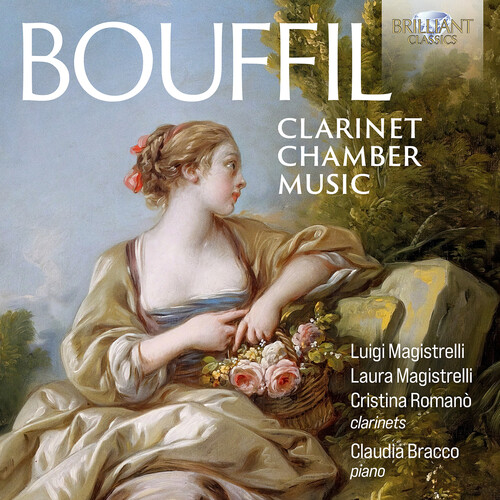Show results for
Deals
- 4K Ultra HD Sale
- 50s Films Sale
- Action Sale
- Alternative Rock Sale
- Anime sale
- Award Winners Sale
- Bear Family Sale
- Blu ray Sale
- Blues on Sale
- British Sale
- Christmas in July
- Classical Music Sale
- Comedy Music Sale
- Comedy Sale
- Country Sale
- Criterion Sale
- Drama Sale
- Electronic Music sale
- Folk Music Sale
- Horror Sci fi Sale
- Kids and Family Sale
- Metal Sale
- Music Video Sale
- Musicals on Sale
- Mystery Sale
- Naxos Label Sale
- Page to Screen Sale
- Paramount Sale
- Rap and Hip Hop Sale
- Reggae Sale
- Rock
- Rock and Pop Sale
- Rock Legends
- Soul Music Sale
- TV Sale
- Vinyl on Sale
- War Films and Westerns on Sale

Clarinet Chamber Music
- Format: CD
- Release Date: 9/23/2022

Clarinet Chamber Music
- Format: CD
- Release Date: 9/23/2022
- Composers: Jacques-Jules Bouffil
- Label: Brilliant Classics
- UPC: 5028421966113
- Item #: 2510019X
- Genre: Classical
- Release Date: 9/23/2022

Product Notes
Little is known of Jacques-Jules Bouffil (or Boufil, 1783-1868) before his admission to the newly founded Paris Conservatoire in 1801. There he became a clarinet student of Xavier Lefevre, apparently making such rapid progress that he was awarded a premier prix on his graduation in 1806 and appointed second clarinet in the Opera-Comique a year later. In the years following he began to share principal clarinet duties with Charles Duvernoy until eventually (in 1821) succeeding him outright in the post. Enter the Czech-born composer Antonin Reicha, who had arrived in the French capital from Vienna in 1808 fleeing the conflict that had engulfed Europe. A later account of 1837 tells us that while the Theater Feydeau was performing Reicha's opera Cagliostro, the composer was approached one day by Bouffil and a colleague, Guenee, both members of the orchestra, asking for composition lessons. Reicha agreed, and his private class soon swelled to include other talented Parisian instrumentalists, Joseph Guillou (flute), Gustave Vogt (oboe), Antoine Henry (bassoon) and Louis Dauprat (horn) among them. The same account goes on to relay that, as the winds had been neglected as solo instruments in favor of strings by composers of the day (Mozart excepted), Reicha had the idea to combine the five principal winds, and after some research he published six wind quintets in succession, performed by Bouffil and the above-mentioned members of his composition studio over three consecutive winters, in the foyer of the Salle Favart. Coached in composition by Reicha, Bouffil wrote primarily for his own instrument and in a Viennese style attractively modulated with a French accent, having both virtuosic and didactic purposes in mind. Both of these sides of his output receive attention on the present album.

